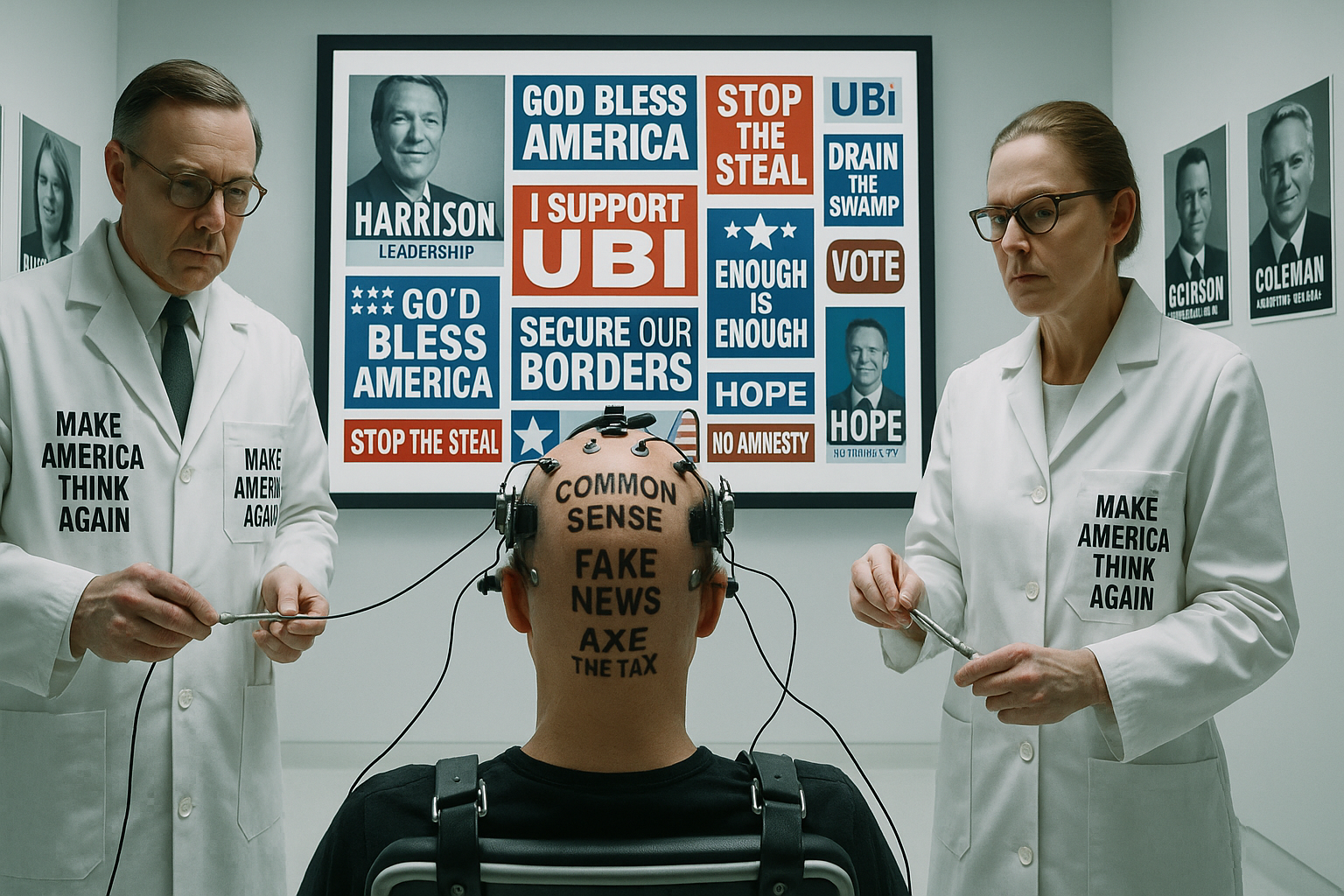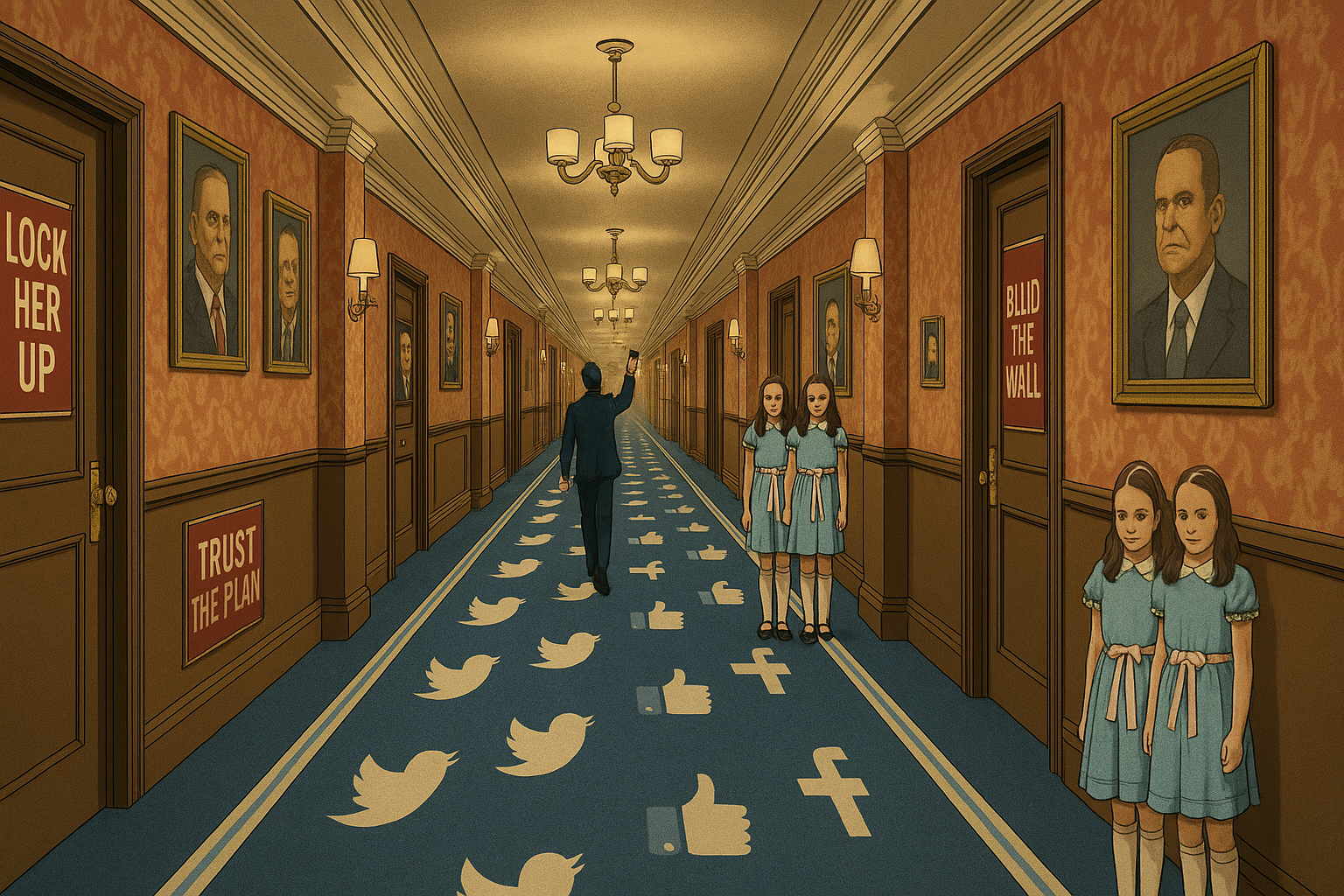How Democracy Learned to Stop Thinking and Love the Slogan
Let's start with a little thought experiment. Think about your average political Facebook or X exchange. Someone posts about healthcare policy. The replies? "Healthcare is a human right!" versus "Nothing is free, snowflake!" End of discussion. No nuance, no policy details, no attempt to engage with the complexity of healthcare economics. Just two tribal battle cries hurled into the digital void like intellectual grenades designed to end thought rather than provoke it.
Welcome to the wonderful world of thought-terminating clichés, where democracy goes to die one soundbite at a time.
The Science of Shutting People Up
Robert Jay Lifton, the psychiatric genius who studied Chinese Communist brainwashing techniques (you know, the fun guys who gave us re-education camps), coined the term "thought-terminating clichés" in 1961. These are phrases specifically designed to halt complex thinking faster than a brick wall stops a Tesla. They're the linguistic equivalent of hitting Ctrl+Alt+Delete on someone's brain.
But here's where it gets interesting—and by interesting, I mean absolutely terrifying.
What started as a tool for totalitarian mind control has become the backbone of democratic political discourse. It's like we took the worst parts of 1984 and said, "You know what? Let's do this, but voluntarily and with more TikTok dances."
The Algorithm of Apocalypse
Social media algorithms have turned thought-terminating clichés into the crack cocaine of digital engagement. These platforms don't care if you're sharing thoughtful policy analysis or screaming "Orange Man Bad" into the void—they just want that sweet, sweet engagement.
Remember "Let's Go Brandon." This phrase, which essentially weaponized a NASCAR interview into a political rally cry, exploded across platforms because algorithms love simple, emotionally charged content that generates immediate reactions. The more you tweet it, the more it gets pushed to others, creating a feedback loop that’s more addictive than a slot machine built by a behavioural psychologist on Adderall.
Meanwhile, nuanced discussions about fiscal policy get approximately zero algorithmic love.
Why? Because explaining the intricacies of federal spending doesn't make people angry enough to share, comment, or doom-scroll for hours. The algorithm has essentially gamified stupidity, rewarding the lowest common denominator while burying anything that requires more than two brain cells to process.

From Campaign Slogans to Cult Mantras
Here's where things get spicy. The language of political discourse has become indistinguishable from cult speak. Don't believe me? Let's compare:
Political Clichés:
- "Real patriots support this."
- "You're either with us or against us."
- "Trust the process."
- "Don't be divisive."
Cult Speak:
- "True believers follow the leader."
- "There's no salvation outside the group."
- "Surrender to the higher power."
- "Negative thoughts bring negative energy."
Spot the difference? Neither can I. Both employ similar psychological tactics: creating in-groups and out-groups, demanding unquestioning loyalty, and stifling critical thinking. The only difference is that one charges membership fees upfront, and the other wants your vote.
The Weaponization of "Fake News"
Nothing illustrates the cult-like nature of modern political clichés better than "fake news." This phrase has become the political equivalent of calling everything you dislike "Satan." Don't like a news report? Fake news. Uncomfortable with polling data? Fake news. Someone mentions basic facts about climate change? Straight to fake news jail.
It's the perfect thought-terminating cliché because it requires zero evidence, brooks no discussion, and creates an impenetrable bubble where any inconvenient information can be dismissed without consideration. It's a magical wand that makes reality disappear whenever it becomes problematic.
The genius—and I use that term in the same way I'd describe the engineering behind a particularly effective bioweapon—is that it turns the entire concept of truth into a team sport. Facts aren't facts anymore; they're either "our facts" or "their facts," and never shall the twain meet.
The Economic Model of Intellectual Bankruptcy
Social media platforms have created an attention economy where thought-terminating clichés are the only currency that matters. Complex ideas require time and effort to understand, but clichés deliver instant gratification with minimal cognitive investment.
Do you want a five-course meal or a bag of Cheetos? Sure, the meal is more nutritious and satisfying, but the Cheetos are ready NOW! Require no preparation and trigger immediate pleasure responses. Guess which one wins when you're scrolling through your feed at 2 AM?
Studies show that content containing moral outrage spreads six times faster than neutral content.
Simple binaries generate more engagement than nuanced takes. The algorithm has essentially turned our entire political discourse into a giant carnival game, and the only prizes are outrage points and tribal validation.
The Death of Democratic Discourse
Here's what makes this particularly insidious: democracy depends on citizens' ability to engage with complex issues. When voters can't think past bumper sticker slogans, how can they possibly make informed decisions about healthcare policy, international relations, or economic regulation?
We've created a system where "Build the Wall" gets more traction than any serious discussion about immigration reform. Where "Defund the Police" becomes the extent of criminal justice debate. Where "Stop the Steal" replaces actual examination of election security measures.
We've decided that governing a complex modern society should be done via fortune cookie wisdom and Twitter/X polls.

The Cult Playbook Goes Mainstream
Authoritarian movements have consistently used these techniques, but social media has democratized them—and by democratized, I mean infected the entire body politic with them.
Here's how the cult playbook has gone mainstream:
1. Creating Sacred Phrases: Just like cults have mantras, political movements now have sacred slogans that cannot be questioned. Try criticizing "Make America Great Again" in certain circles and watch how quickly you're labelled a traitor.
2. Emotional Manipulation: Cults exploit emotions to override logic. Sound familiar? Modern politics does the same thing. "They're coming for your freedoms" hits the same psychological buttons as "The end times are coming."
3. Silencing Dissent: In cults, questioning the leader is blasphemy. In politics, it's become "being divisive" or "not supporting the team." Same result, different wrapper.
4. Creating False Urgency: Cults always have an imminent crisis that requires immediate action without deliberation. Politics now operates on the same principle—everything is an existential crisis that requires instant, unthinking support.
The Specific Mechanisms of Mind Control
Let's get into the weeds of how this works:
Echo Chamber Amplification: Algorithms ensure that once you engage with certain clichés, you'll see more of them. Like quicksand, the more you struggle against it by engaging, the deeper you sink.
Cognitive Overload: When people are bombarded with information, they retreat to simple heuristics. Clichés provide these shortcuts, even when they're completely inappropriate for the complexity of the issue.
Social Proof Manipulation: When clichés go viral, they create the illusion of consensus. If everyone's saying, "trust the science," questioning it becomes social suicide.
Gamification of Conflict: Platforms turn political discourse into a competition where the goal is to win arguments, not to find the truth. Clichés become weapons in this zero-sum game.
The International Perspective: A Global Pandemic of Stupid
This isn't just a US problem. Populist movements worldwide have embraced the cult playbook:
- Brexit's "Take Back Control" meaninglessly oversimplified the complexities of EU membership
- Putin's "Russia's Eternal" conflates patriotism with blind obedience
- Erdoğan's "New Turkey" shuts down discussion about democratic backsliding
The internet has become a global Petri dish for political simplicities, with each culture adding its flavour of intellectual poison to the mix.
The Psychology of Surrender
Here's the dirty secret about thought-terminating clichés: they work because they're comforting. Thinking is hard. Uncertainty is uncomfortable. Having all the answers, even if they are wrong, feels better than admitting that complexity exists.
It's like choosing to believe the Earth is flat because spherical geometry is complicated. The psychological relief of simplicity outweighs the cognitive dissonance of being objectively wrong.
Case Studies in Democratic Destruction
"This is Who We Are" vs "This Isn't Who We Are": These opposing clichés appear after every national crisis, allowing people to either embrace or reject difficult truths about their society without engaging with the actual evidence.
"Both Sides Do It": The ultimate discussion ender, creating false equivalence between wildly different situations. It's like saying a paper cut and a severed artery are the same because they both involve bleeding.
"Common Sense": Perhaps the most insidious of all, because it implies that disagreement stems from stupidity rather than legitimate differences in values or priorities.
The Social Media Feedback Loop from Hell

Platforms have accidentally (or not so accidentally) created a system that rewards the political equivalent of junk food:
- The algorithm prioritizes engagement
- Outrage generates engagement
- Clichés generate outrage
- Clichés get amplified
- Nuance gets buried
- Standards for discourse plummet
- Repeat until democracy collapses
It's a perfect storm of profit incentives, psychological manipulation, and democratic vulnerability. Mark Zuckerberg didn't set out to destroy rational discourse, but here we are, with democracy dying to the ping of iPhone notifications.
Deprogramming Democracy
So, what do we do? First, recognize that we're all susceptible to this manipulation. That holier-than-thou attitude of "I'm too smart for this" is precisely what makes us vulnerable.
Second, develop what I call "cliché detection software" in your brain. When you hear a phrase that:
- Oversimplifies complex issues
- Triggers strong emotional responses
- Discourages questions or nuance
- Creates artificial urgency
Step back.
Take a breath.
Ask yourself what the speaker is trying to get you to stop thinking about.
Third, demand better from our leaders and ourselves. When a politician responds to a complex question with a slogan, don't applaud—ask for specifics. When you feel the urge to share that perfectly worded takedown tweet, pause and ask whether it contributes anything meaningful to the discourse.
The Nuclear Option: Reform the Algorithms
The real solution requires something more radical: fundamentally changing how social media platforms operate.
What if algorithms prioritized:
- Time spent reading rather than just reacting
- Follow-up questions rather than dismissive responses
- Sources that provide context rather than just confirmation
- Content that generates thoughtful discussion rather than mindless sharing
Of course, this would require platforms to prioritize democracy over profit margins, which is about as likely as Facebook admitting that maybe, just maybe, radicalizing your grandmother wasn't the best business model. But who needs democracy when you've got dopamine hits, right?
Player 2 Has Entered the Game: Your Move
We're at a crossroads. We can continue down the path of intellectual fast food—convenient, addictive, ultimately destructive—or we can choose the harder path of nuance, complexity, and actual thought.
The irony is delicious: in trying to make political communication more efficient and engaging, we've made it completely dysfunctional. We've optimized for everything except the one thing democracy needs—thoughtful, informed citizens capable of handling complexity.
So, the next time you see a political cliché trending, remember that someone, somewhere, is using a 1960s brainwashing technique to manipulate your thinking. The question is whether you'll let them succeed.
The choice is yours. Just try not to express it in a bumper sticker.


